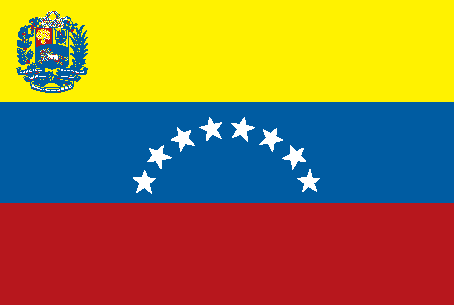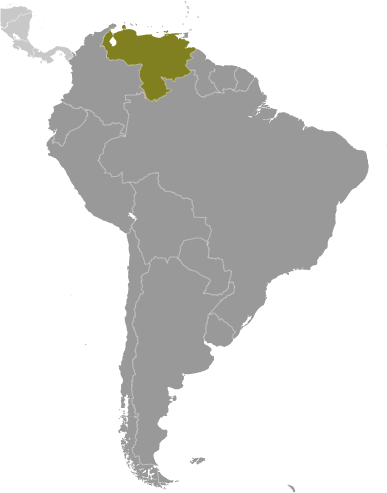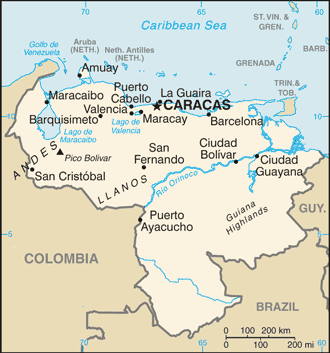Venezuela was one of three countries that emerged from the collapse of Gran Colombia in 1830 (the others being Ecuador and New Granada, which became Colombia). For most of the first half of the 20th century, Venezuela was ruled by generally benevolent military strongmen, who promoted the oil industry and allowed for some social reforms. Democratically elected governments have held sway since 1959. Hugo CHAVEZ, president since 1999, seeks to implement his "21st Century Socialism," which purports to alleviate social ills while at the same time attacking capitalist globalization and existing democratic institutions. Current concerns include: a weakening of democratic institutions, political polarization, a politicized military, drug-related violence along the Colombian border, increasing internal drug consumption, overdependence on the petroleum industry with its price fluctuations, and irresponsible mining operations that are endangering the rain forest and indigenous peoples.
Country Name
Conventional long form:Bolivarian Republic of Venezuela
Conventional short form:Venezuela
Local long form:Republica Bolivariana de Venezuela
Local short form:Venezuela
Government Type
federal republic
Capital
Name:Caracas
Geographic coordinates:10 30 N, 66 56 W
Time difference:UTC-4.5 (half an hour ahead of Washington, DC during Standard Time)
Administrative divisions
23 states (estados, singular - estado), 1 capital district* (distrito capital), and 1 federal dependency** (dependencia federal); Amazonas, Anzoategui, Apure, Aragua, Barinas, Bolivar, Carabobo, Cojedes, Delta Amacuro, Dependencias Federales**, Distrito Capital*, Falcon, Guarico, Lara, Merida, Miranda, Monagas, Nueva Esparta, Portuguesa, Sucre, Tachira, Trujillo, Vargas, Yaracuy, Zulia
note: the federal dependency consists of 11 federally controlled island groups with a total of 72 individual islands
Independence
5 July 1811 (from Spain)
National Holiday
Independence Day, 5 July (1811)
Constitution
30 December 1999
Legal system
open, adversarial court system; has not accepted compulsory ICJ jurisdiction
Suffrage
18 years of age; universal
Executive branch
Chief of state:President Hugo CHAVEZ Frias (since 3 February 1999); Executive Vice President Elias JAUA Milano (since 26 January 2010); note - the president is both the chief of state and head of government
Head of government:President Hugo CHAVEZ Frias (since 3 February 1999); Executive Vice President Elias JAUA Milano (since 26 January 2010)
Cabinet:Council of Ministers appointed by the president
(For more information visit the World Leaders website)
Elections:president elected by popular vote for a six-year term (eligible for unlimited reelection); election last held on 3 December 2006 (next to be held in December 2012)
note: in 1999, a National Constituent Assembly drafted a new constitution that increased the presidential term to six years; an election was subsequently held on 30 July 2000 under the terms of this constitution; in 2009, a national referendum approved the elimination of term limits on all elected officials, including the presidency
Election results:Hugo CHAVEZ Frias reelected president; percent of vote - Hugo CHAVEZ Frias 62.9%, Manuel ROSALES 36.9%
Legislative branch
The unicameral National Assembly or Asamblea Nacional (167 seats; members elected by popular vote to serve five-year terms; three seats reserved for the indigenous peoples of Venezuela)
Elections:last held on 4 December 2005 (next to be held in 26 September 2010)
Election results:percent of vote by party - NA; seats by party - pro-government 167 (MVR 114, PODEMOS 15, PPT 11, indigenous 2, other 25), opposition 0; total seats by party as of 16 December 2009 - pro-government 156 (PSUV 141, PPT 5, PCV 4, other 6), PODEMOS 6, FPH 5
Judicial branch
Supreme Tribunal of Justice or Tribuna Suprema de Justicia (32 magistrates are elected by the National Assembly for a single 12-year term)
Political Parties and Leaders
A New Time or UNT [Omar BARBOZA]; Brave People's Alliance or ABP [Oscar PEREZ]; Christian Democrats or COPEI [Luis Ignacio PLANAS]; Communist Party of Venezuela or PCV [Oscar FIGUERA]; Democratic Action or AD [Henry RAMOS Allup]; Fatherland for All or PPT [Jose ALBORNOZ]; For Social Democracy or PODEMOS [Ramon MARTINEZ]; Justice First [Julio BORGES]; Movement Toward Socialism or MAS [Felipe MUJICA]; United Socialist Party of Venezuela or PSUV [Hugo CHAVEZ]; Venezuela Project or PV [Henrique SALAS Romer]
Political pressure groups and leaders
FEDECAMARAS, a conservative business group; VECINOS groups; Venezuelan Confederation of Workers or CTV (labor organization dominated by the Democratic Action)
International organization participation
Caricom (observer), CDB, FAO, G-15, G-24, G-77, IADB, IAEA, IBRD, ICAO, ICC, ICCt, ICRM, IDA, IFAD, IFC, IFRCS, IHO, ILO, IMF, IMO, IMSO, Interpol, IOC, IOM, IPU, ISO, ITSO, ITU, ITUC, LAES, LAIA, LAS (observer), Mercosur (associate), MIGA, NAM, OAS, OPANAL, OPCW, OPEC, PCA, PetroCaribe, RG, UN, UNASUR, UNCTAD, UNESCO, UNHCR, UNIDO, Union Latina, UNWTO, UPU, WCO, WFTU, WHO, WIPO, WMO, WTO
Diplomatic representation in the US
Chief of mission:Ambassador Bernardo ALVAREZ Herrera
Chancery:1099 30th Street NW, Washington, DC 20007
Telephone:[1] (202) 342-2214
FAX:[1] (202) 342-6820
Consulate(s) general:Boston, Chicago, Houston, Miami, New Orleans, New York, San Francisco, San Juan (Puerto Rico)
Diplomatic representation from the US
Chief of mission:Ambassador Patrick DUDDY
Embassy:Calle F con Calle Suapure, Urbanizacion Colinas de Valle Arriba, Caracas 1080
Mailing address:P. O. Box 62291, Caracas 1060-A; APO AA 34037
Telephone:[58] (212) 975-6411, 907-8400 (after hours)
FAX:[58] (212) 907-8199
Flag description
three equal horizontal bands of yellow (top), blue, and red with the coat of arms on the hoist side of the yellow band and an arc of eight white five-pointed stars centered in the blue band; the flag retains the three equal horizontal bands and three main colors of the banner of Gran Columbia, the South American republic that broke up in 1830; yellow is interpreted as standing for the riches of the land, blue for the courage of its people, and red for the blood shed in attaining independence; the seven stars on the original flag represented the seven provinces in Venezuela that united in the war of independence; in 2006, President Hugo CHAVEZ ordered an eighth star added to the star arc - a decision that sparked much controversy










